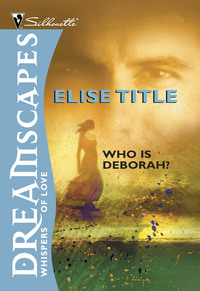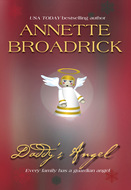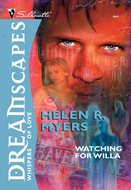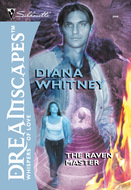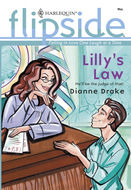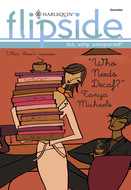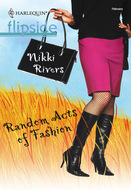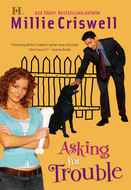Książki nie można pobrać jako pliku, ale można ją czytać w naszej aplikacji lub online na stronie.
Czytaj książkę: «Who Is Deborah?»
Stay low. Keep your head down. One false move and it’s curtains.
I fell out of the lounge chair onto the ground. And then I was crawling. No, dragging myself along the grass, like a soldier under fire. The landscape around me blurred as I moved closer to the edge of the bluf. I dragged myself on, closer, closer to the edge. As if I was being lured by a siren.
No, not lured, I thought, my head clearing for an instant. I wasn’t dragging myself. I was being dragged. Someone was tugging at me. Pushing me. And the cliff was coming up on me.
Terror gripped me. I tried with all my might to pull myself away, but a wave of cold black washed over me, paralyzing my limbs. Then I heard the echo of a scream.
It was me. Hands were grabbing at me. I opened my eyes and stared straight down the jagged mountain cliff. I felt doomed. Lost.
Elise Title is a leading author of women’s fiction, who has penned over twenty bestselling books. With more than eight million copies of her books in print, she is one of the most popular writers of romance fiction. Her fast-paced style and contemporary characters guarantee that every book is a page-turner.
Who is Deborah?
Elise Title

MILLS & BOON
Before you start reading, why not sign up?
Thank you for downloading this Mills & Boon book. If you want to hear about exclusive discounts, special offers and competitions, sign up to our email newsletter today!
Or simply visit
Mills & Boon emails are completely free to receive and you can unsubscribe at any time via the link in any email we send you.
CONTENTS
CHAPTER ONE
CHAPTER TWO
CHAPTER THREE
CHAPTER FOUR
CHAPTER FIVE
CHAPTER SIX
CHAPTER SEVEN
CHAPTER EIGHT
CHAPTER NINE
CHAPTER TEN
CHAPTER ELEVEN
CHAPTER TWELVE
CHAPTER THIRTEEN
CHAPTER FOURTEEN
CHAPTER FIFTEEN
CHAPTER SIXTEEN
EPILOGUE
CHAPTER ONE
It all began the day I discovered I was Deborah Steele. I awoke early that morning, just after dawn—a sharp break in my routine of sleeping till noon. Usual, at least, for the past two months. Before then…Well, that was something else.
I remember waking anxious and disoriented, crying out in a low, broken voice as I heard a clap of thunder. I hated thunderstorms.
Lightning flashed across my drawn window shade and I was overwhelmed by feelings of panic and helplessness. I pulled my pillow over my head, blocking out sight and sound, curling up my whole body as if once again I was fending off…
Fending off what? That was the problem. As Dr. Royce had told me time and again, over the past two months, I wouldn’t allow myself to remember. I suppose he was correct. I was afraid. Everyone is afraid at times; but this fear lived inside me like a malignant virus for which there was no cure.
Tears spiked my eyes, dread mingling with frustration and desperation. I squeezed my eyes shut, praying for the awful feelings to pass, for the storm not to come, and most of all, for someone to find me—to find me in the truest sense. Because I felt lost. Completely and utterly lost.
By midmorning, I had managed to pull myself together. The sky was gray and overcast but it wasn’t raining yet. Maybe the storm wouldn’t materialize, after all. Maybe I’d make it through the day without unraveling. Not a lot to ask for. I could have asked for more. Much more. But I was working hard on not asking for things I wasn’t likely to get or setting myself up for disappointment. Which is why what happened later that day threw me for such a loop…
I was in my usual corner of the occupational-therapy room, my easel set up by a large window that let in the northern light. I stood there painting, as I did every afternoon between the end of my group-therapy meeting and dinner. There were other patients scattered about the large space, busy at projects, some of them chatting as they pounded clay or wove baskets. But I kept to myself. Not that I mingled much at any time of the day, but this was my special time, a time just for me. Two precious hours when I could lose myself in other worlds. Two hours when I could forget the hospital, the tedium, the persistent prodding, the endless frustration, the awful loneliness and the ineffable sense of loss.
Painting was my joy and my salvation. I loved the smell of the oil paints and even the turpentine. When I painted—only when I painted—did I somehow feel connected to myself. While all the other hours of my day dragged by, these two golden hours seemed to pass in the blink of an eye. I knew they had passed when I heard a familiar voice behind me.
“It’s very good.”
The pleasant, approving voice belonged to John Harris, my art therapist. The tall, gangly young man with a shock of red hair stood just off to my right, observing my painting with one of his thoughtful looks.
It was a look I had come to know well over the past two months. I returned his look with one he’d seen often enough before—a look at once guarded and sardonic. “Yes, but that isn’t the point, is it?”
He smiled good-humoredly. “Not the whole point.”
I didn’t respond. I set my brush down and joined him in his study of my canvas—a landscape with a still, blue sky dotted with clouds suspended over a mountain scene. And, as in each of my paintings, there was a single human figure—a young woman with flowing blond hair. This one standing on the top of the mountain, with the wind blowing at her back and looking out to the west. No, not merely looking; searching. I knew this as did John, even though—as in all my paintings—the woman was faceless.
“Tell me about her,” John said gently. I was in ‘real time’ again, hospital time, prodding time.
“You always ask me that. Why?”
He reacted to the added edge in my voice. “It’s the weather, isn’t it?”
“I suppose,” I replied noncommittally.
He gestured to the woman on the canvas. “Does she like the mountains?”
“I’m really not sure. Or maybe she’s the one who isn’t sure.”
He smiled and I offered up a quick, wry smile in return.
“What do you think would happen,” he asked in that measured voice that always made me uneasy, “if you painted her to look like you? Your face, I mean?”
Instinctively, my hands flew to my face. I could feel the tremor radiating from my fingers against my warm cheeks. “But this isn’t really…my face.”
A ribbon of color—ruby red—squeezed from a tube of paint flashed before my eyes. Only it wasn’t paint. It was…blood. Ruby-red blood. My blood. Hot and moist and fetid, blurring my vision. And with the image came a violent spasm of shock. That first glimpse of myself in the hospital before the plastic surgeon had put me together again—in a fashion.
John gave me a sympathetic look. “It’s very possible that you don’t look all that different than you did before.”
My temples began to beat like a drum. “But I don’t know that, do I?” I snapped at him. “Because I haven’t the foggiest notion what I looked like before.” A dam seemed to burst in me. “Why have any face at all when I’m faceless inside? Anyway, if this is my face, why hasn’t anyone come forward to identify me? I ran a photo of myself for over a week in the newspaper with the biggest circulation in New York. No one recognized me, did they?” I finished bleakly.
“Katherine…”
My defenses collapsed, despair washing over me. “Even the name isn’t mine. Made up out of thin air like everything else about me.”
He looked distraught at my outburst and I felt a stab of guilt. My predicament wasn’t John’s fault.
“I’m sorry. It is the weather. I woke up early. I’ve been wound up all day. Sometimes I wish…”
“What do you wish?”
“That the police had just left my bruised and battered body on the sidewalk that rainy night.”
I could hear the rain again, pounding in my head. That was all I could remember of that night. That, and then waking up a few hours later in the emergency room of the New York General, with a sweet-faced, young policeman gazing anxiously down at me. I could picture him perfectly.
“You must have fought back hard,” the policeman had said, a touch of awe in his voice.
My own voice seemed to have dried up. When I’d finally managed to speak, I discovered it wasn’t easy to move my lips. My face was swathed in bandages. Later I was informed that I’d suffered a concussion and that both my nose and jaw had been broken. But at that moment I wasn’t concerned about my mutilated face. Terror had gripped me. “Was I…?”
Before I’d had to say the word raped, he’d hurriedly shaken his head. I’d felt a rush of relief. It hadn’t lasted long—just until he’d started to question me and to my horror, I hadn’t been able to give him any answers. Not only had I been unable to tell him anything about the assault, I’d even forgotten my name. I couldn’t remember anything. My mind was a complete blank. And the police had little to go on, since I’d been found without any identification on me, in a dark alley in a commercial district of the city.
The doctors tried to assure me that once the trauma wore off, my memory would gradually return. But it hadn’t. I’d undergone plastic surgery to have my nose and jaw restructured, and then I’d been moved to the psychiatric ward of the hospital.
“Katherine.”
John Harris’s voice drew me from my reverie. I saw that Dr. Royce was standing beside John. I’d been so wrapped up in my thoughts I hadn’t even seen my psychiatrist come in. He was staring at my painting and then he turned to me.
“Mountains,” he murmured. “Interesting.”
I sensed some hidden import in the tone of his voice that made the muscles between my shoulder blades tighten. This was odd, because the distinguished-looking psychiatrist generally had the opposite effect on me. I’d developed something of a crush on the soft-spoken, good-looking, kindly doctor. Sometimes, when I was particularly depressed, I would fantasize that he had a special fondness for me, as well. Sometimes I even wondered if it was all a fantasy. To my surprise, I found myself wondering it at that moment. I wasn’t sure why. I thought it might be the heightened tenderness and concern I detected in his warm brown eyes. Ironically, instead of being pleased, I felt a flash of alarm. Something was troubling him. Something was wrong.
“What is it?” My voice was a bare whisper.
“Let’s talk in my office,” he said, in a soothing tone. Only it didn’t soothe me at all.
I was glad his office was just a few doors down from the O.T. room.
I didn’t realize I was holding my breath until he shut his office door, and I finally exhaled. I spun around to face him. “Please. Tell me.”
He nodded, gesturing to a big, comfortable gray-tweed armchair. For the past two months, I’d spent an hour every other day in that chair, in therapy.
I managed a lopsided smile as I moved to the chair. “All of a sudden, my legs feel like jelly.”
Dr. Royce took the matching armchair that was a few feet from mine, forgoing his usual seat behind his desk. I was completely convinced that something big was brewing. I felt both nervous and excited.
“Someone’s come to see you.”
No sooner had he said those words than tears instantly flooded my eyes. I thought I must be hearing things. But I could see from the doctor’s sober expression I’d heard correctly. “Who?” I managed to eke out.
He put off answering for a moment—his way of giving me a chance to gather myself. There was an electric coffeepot on a table near him. He poured a cup and handed it to me. My hands were trembling badly as I took it from him, but I sipped the hot, strong brew gratefully. Then I plucked out some tissues conveniently placed by my chair and wiped my eyes and blew my nose.
“His name is Greg Eastman.”
Dr. Royce fixed his gaze on me as he said the name. If he expected some reaction, a ray of light to dawn, I disappointed him. Not to mention my own sorry disappointment. The name meant absolutely nothing to me.
“Who is he? How…How does he know me?”
“He’s a private investigator.” A faint smile curved the psychiatrist’s lips. “He recognized you from the photo you ran in the paper.”
I started to smile, too. “He recognized me? Then…then my face isn’t…I haven’t…changed….”
“Not enough for him not to recognize you.”
There was something I didn’t understand. “Are you saying he wasn’t sure, at first? Is that why he’s waited…?”
“No. He told me he was out of town when your photo ran in the paper, but his secretary had, as a matter of practice, clipped it out and filed it in his Missing Persons folder. The minute he saw it…” Dr. Royce paused for a moment. “He knew it was you.”
I waited, as if suspended, for him to tell me who I was. I will never forget that wait. A part of me felt it was interminable; another part of me was afraid for it to conclude. Discovering my identity could be as frightening as not knowing it at all.
When Dr. Royce finally spoke, there was such solemnity in his voice that the hairs on my forearms literally stood on end. “He says your name is Deborah Steele.”
I stared at him blankly, not knowing what to say to this announcement, how to react. It was the strangest sensation. I suddenly went numb all over.
“Deborah.” I tried the name out for the first time. It sounded as foreign and removed from me as the name Katherine—as any name I might have pulled out of a hat.
My hand was shaking so, I only barely managed to set my coffee cup down on the table. “Is he sure?”
“Naturally, he wants to see you in person, but…I think he’s pretty certain. He knew you. Quite well, he says. He knew…that you painted.”
My eyes widened.
“And he brought along a photograph.”
“Of…her?” I couldn’t think of her as me.
Not yet. It was all too unreal. I wasn’t even sure I wouldn’t wake up any moment and find out this was all some wild, impossible dream.
“The similarities are striking.”
I sensed he was holding something back. “And the differences? Are they striking, too?”
It was the only time I ever saw Dr. Royce blush. “Naturally…there are some differences. The nose and jawline…” His voice trailed off.
I had a feeling there were more profound differences, but I wasn’t sure I was ready to hear what they were. “This private detective—Greg Eastman—you say he knew me.”
Dr. Royce leaned forward a little. I braced myself. As it turned out I needed bracing.
“He’s not merely a private investigator. He’s a close friend of…your husband.” He exhaled a breath. “Nicholas Steele.”
Husband? My heart began to pound and a line of perspiration broke out across my brow. I could feel the color drain from my face. I must have looked ghastly, because Dr. Royce’s expression became etched with concern.
“It’s a lot to take in. Don’t expect to do it all at once,” he cautioned in that comforting voice he used whenever I became overly agitated.
“Husband?” This time I said the word aloud, but it still didn’t sound real. Or possible. I looked at my bare ring finger. Had I worn a wedding band before the attack? Had it been stolen, along with everything else I had on me? But, I didn’t feel…married. I felt so…detached. I stared incredulously at Dr. Royce. “You say his name is…Nicholas Steele?”
He was watching me closely. “Does it sound familiar to you?”
I started to shake my head, but then I stopped abruptly, my heartbeat accelerating. “I…don’t know. It does…ring a bell. I…I think I’ve heard the name…before.”
Could this be that first chink in the armor? If it was, I would have expected to see some sign of pleasure in the doctor’s face. I didn’t. If anything, his expression took on amore somber cast. I was crestfallen.
“Nicholas Steele is a writer,” he said gently. “His novels are bestsellers. You might have seen some of his books here at the hospital or seen an ad for one of them in a newspaper.” He paused. “On the other hand, it is possible you may—”
I shook my head then. “No,” I said, cutting him off. “I must have seen his name on a book or in the newspaper. It certainly doesn’t conjure up any images.”
“Maybe that’s just as well.”
As soon as the words had slipped out of his mouth, I could see that he regretted them.
He smiled awkwardly. “I only meant…He writes horror novels.”
By this point my head was swimming. How could I, the victim of a horror so traumatic I’d erased it and everything that came before it from my mind, be the wife of a famous—for all I knew, infamous—writer of ghoulish deeds? It was utterly perverse and incredible. I had to be dreaming—an insane nightmare.
“You don’t believe this, do you? You don’t think I’m the wife of a man…like that?”
Dr. Royce donned a fatherly expression. “Like what? Just because he writes horror stories doesn’t mean—”
“I can’t even imagine reading a horror novel. I can’t believe I…I ever did.”
“Wives aren’t required to be fans of their husbands’ work.”
“You think I’m Deborah?”
“I talked with Mr. Eastman for close to two hours. He was very candid, and he gave me a great number of details that I must say sounded credible.” He hesitated, and my body tensed. “He also told me that Nicholas Steele lives in a small town about three hours north of here. Sinclair. It’s in the Catskill Mountains.”
I finally understood his remark back in the O.T. room when he was looking at my landscape. “I wasn’t painting any particular mountain. I…I couldn’t have been.”
“Not on a conscious level,” he went on, in an almost-chatty tone. I knew he was trying to calm me down, but even he had to know that wasn’t a likely prospect. Still, though my head was spinning with it all, I tried to concentrate on his words.
“Mr. Eastman has a getaway cottage up in Sinclair,” Dr. Royce was saying. But I wanted to hear about Nicholas Steele, this writer of horror stories, this man who was supposedly my husband. Or did I?
“Eastman spends most weekends and summers there. He’s known Steele for more than five years. They’re tennis partners and Eastman says he’s even been acknowledged in a couple of Steele’s books for giving him technical advice. From what he said, I gather he and Steele are very good friends.”
“And what about me?” There. I’d said it. Me. Not her. Me. It was the strangest feeling, yet not altogether unpleasant.
I saw that Dr. Royce didn’t miss the shift in pronouns. “Nicholas Steele was, according to Eastman, a dyed-in-the-wool bachelor until he was off in St. Martin doing some research on a book and met ‘the girl of his dreams.’ That’s a direct quote from Mr. Eastman.”
I found myself smiling, but then the incredulity of it all made me stop abruptly.
Dr. Royce continued. “When he returned to Sinclair three weeks later, he had a bride with him.”
“A whirlwind courtship, marriage on a tropical island…It sounds like something out of a romance novel.” But, better a romance than a horror novel.
“That was just over two years ago,” he told me quietly. “And then, two and a half months ago, Deborah Steele disappeared.”
“Disappeared?” I echoed, and shivered.
Dr. Royce’s gaze fixed on me. “She left the house to catch the train down to Manhattan for a shopping trip and…and that was the last that was heard of her. Eastman says he spent a month working both with the police and on his own, trying to trace her. Finally he returned to Sinclair, since he thought it was possible she could have met with some kind of accident or foul play before ever getting on the train. After getting nowhere in Sinclair, either, he came back to Manhattan and—”
“Saw the picture of me in his file.”
Dr. Royce nodded. I found myself nodding back inanely, the whole time feeling completely adrift. Eventually I asked, “Now what?”
“Mr. Eastman wants to see you, talk to you. I told him I would talk with you first and that I’d suggest you let all this…news…sink in for a day or two, or however long you need. There’s no rush. I know all this is an enormous shock to your system—”
“Is he still here?”
Dr. Royce hesitated. “Yes, but—”
“I want to see him.”
“Katherine—”
“But it isn’t Katherine, is it?”
He scowled. “For you, it still is. You can’t take on a new name and a whole new identity in a matter of minutes. It will take time. And there’s still the possibility that he’s wrong.”
“All the more reason for us to meet right away,” I insisted.
I could see that Dr. Royce wasn’t particularly pleased with my refusal to take his advice. Now it was I who leaned closer. “I must know. You do understand that.”
He nodded. “My only concern is for your welfare. Too much, too soon—”
“I’m stronger than I appear.” I laughed softly, experiencing a ripple of surprise. “I didn’t know that myself until just now.”
“I did,” he said, a smile curving his lips. And in that smile I saw genuine caring. I think that’s where much of my strength came from. Little did I know that very soon, I’d have to call on that strength in spades.
Darmowy fragment się skończył.
